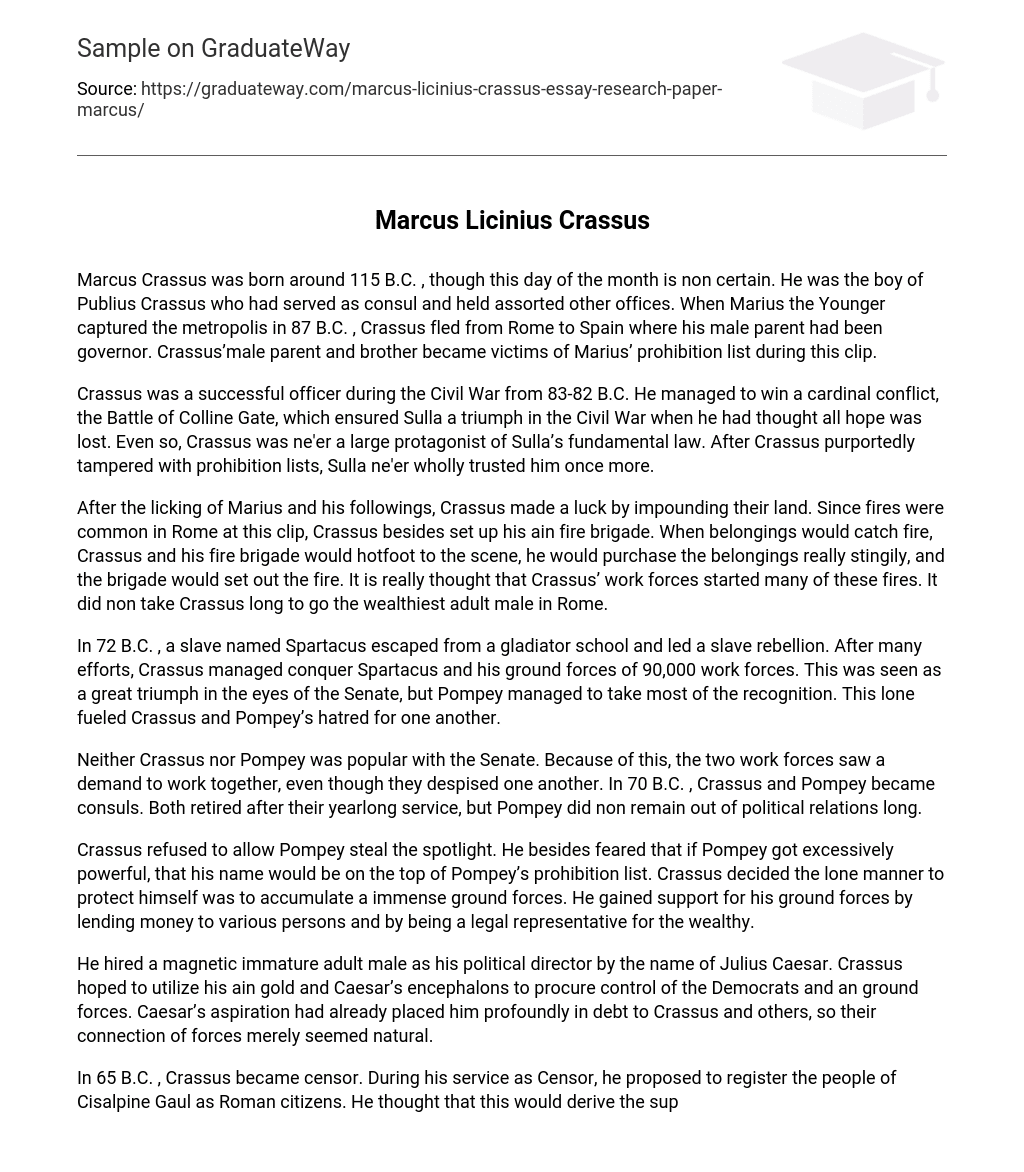Marcus Crassus was born around 115 B.C. , though this day of the month is non certain. He was the boy of Publius Crassus who had served as consul and held assorted other offices. When Marius the Younger captured the metropolis in 87 B.C. , Crassus fled from Rome to Spain where his male parent had been governor. Crassus’male parent and brother became victims of Marius’ prohibition list during this clip.
Crassus was a successful officer during the Civil War from 83-82 B.C. He managed to win a cardinal conflict, the Battle of Colline Gate, which ensured Sulla a triumph in the Civil War when he had thought all hope was lost. Even so, Crassus was ne’er a large protagonist of Sulla’s fundamental law. After Crassus purportedly tampered with prohibition lists, Sulla ne’er wholly trusted him once more.
After the licking of Marius and his followings, Crassus made a luck by impounding their land. Since fires were common in Rome at this clip, Crassus besides set up his ain fire brigade. When belongings would catch fire, Crassus and his fire brigade would hotfoot to the scene, he would purchase the belongings really stingily, and the brigade would set out the fire. It is really thought that Crassus’ work forces started many of these fires. It did non take Crassus long to go the wealthiest adult male in Rome.
In 72 B.C. , a slave named Spartacus escaped from a gladiator school and led a slave rebellion. After many efforts, Crassus managed conquer Spartacus and his ground forces of 90,000 work forces. This was seen as a great triumph in the eyes of the Senate, but Pompey managed to take most of the recognition. This lone fueled Crassus and Pompey’s hatred for one another.
Neither Crassus nor Pompey was popular with the Senate. Because of this, the two work forces saw a demand to work together, even though they despised one another. In 70 B.C. , Crassus and Pompey became consuls. Both retired after their yearlong service, but Pompey did non remain out of political relations long.
Crassus refused to allow Pompey steal the spotlight. He besides feared that if Pompey got excessively powerful, that his name would be on the top of Pompey’s prohibition list. Crassus decided the lone manner to protect himself was to accumulate a immense ground forces. He gained support for his ground forces by lending money to various persons and by being a legal representative for the wealthy.
He hired a magnetic immature adult male as his political director by the name of Julius Caesar. Crassus hoped to utilize his ain gold and Caesar’s encephalons to procure control of the Democrats and an ground forces. Caesar’s aspiration had already placed him profoundly in debt to Crassus and others, so their connection of forces merely seemed natural.
In 65 B.C. , Crassus became censor. During his service as Censor, he proposed to register the people of Cisalpine Gaul as Roman citizens. He thought that this would derive the support of those people for his ground forces. His thought was non surprisingly blocked by the other censor, but the effort was plenty to derive the support of these people.
When Caesar decided to run for election as consul in 60 B.C. , he knew that he needed the support of both Crassus and Pompey. Caesar’s great diplomatic abilities came to visible radiation as he managed to convey the two work forces together slightly pacifically. It was at this point that the three work forces came together to organize the First Triumvirate. Caesar was good on his manner to political power, and Crassus saw this brotherhood as a manner to acquire Torahs passed to assist his concern ventures in Asia.
Caesar was sent to Gaul in 59 B.C. as consul. Since he was gone most of the clip, this left Crassus and Pompey in Rome to dispute violently with one another. From 58 to 56 B.C. , Crassus made serious efforts to restrict Pompey’s power. Caesar saw the demand for his mediation to maintain the Triumvirate from falling apart. With Caesar’s aid in 55, Crassus and Pompey became consuls once more.
Crassus was still covetous of Pompey. He was hungry for military glorification like that of Pompey, and he managed to be placed as governor of Syria in 54 B.C. He began a war with the Parthians that same twelvemonth. He was killed by Parthian bowmans in 53 B.C. in a major licking at the Battle of Carrhae in southern Anatolia.
References
- Gelzer, Matthias. Caesar: Politician and Statesman. Cambridge, Harvard University Press, 1968.
- Nardo, Don. The Importance of Julius Caesar. San Diego, Lucent Books, 1997.
- “Crassus, Marcus Licinius,” Microsoft? Encarta? Online Encyclopedia 2001 hypertext transfer protocol: //encarta.msn.com? 1997-2001 Microsoft Corporation. All rights reserved.





